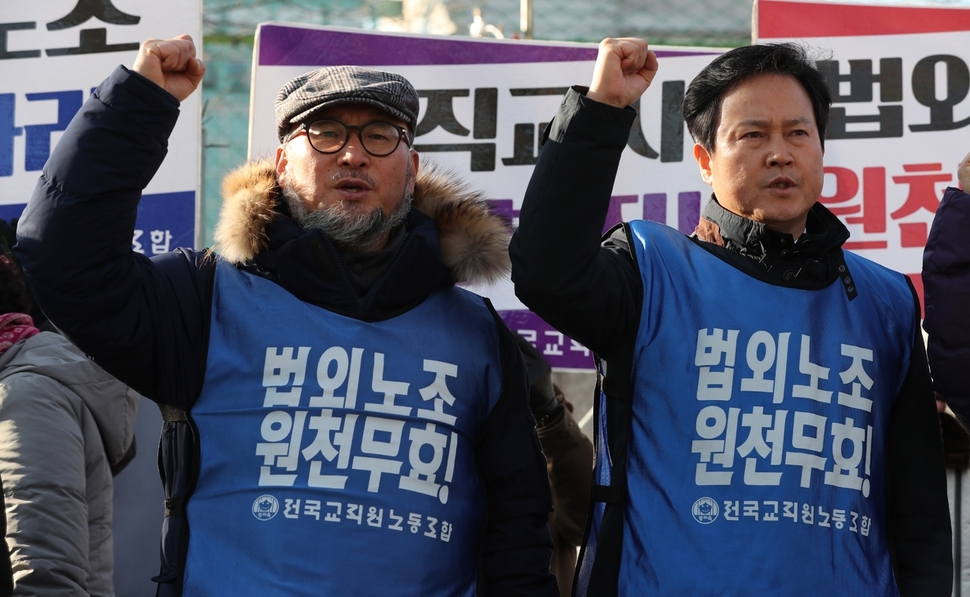 |
|
Cho Chang-ik (left), chairman of the Korean Teachers and Education Workers Union (KTU) holds a press conference in front of the Blue House calling for the legalization of the KTU on Dec. 10. (Baek So-ah, staff photographer)
|
Two conventions concern workers’ freedom of association and right to organize
The National Human Rights Commission of Korea (NHRCK) will soon be recommending to South Korea’s Minister of Employment and Labor that the country become party to two of the International Labour Organization’s core conventions, Conventions No. 87 and 98. The commission announced on Dec. 12 that it had passed a motion to recommend ratifying the ILO’s two conventions during the council’s 19th plenary session on Dec. 10. The commission also resolved to convey this recommendation to the Minister of Employment and Labor before long. “Considering our country’s global standing and its promises to the international community, our government needs to take steps to ratify the ILO’s remaining core conventions,” the commission said. Convention 87 concerns the freedom of association and the protection of the right to organize, while Convention 98 concerns applying the principles of the right to organize and bargain collectively. The two conventions outline the rights to establish and join a union freely chosen without prior permission or discrimination and the right for a union to draw up its bylaws and rules and to elect representatives without interference from the government. South Korea became the 152nd country to join the ILO in 1991, but it has only ratified four of what the ILO General assembly has identified as its eight core conventions. The still unratified conventions are No. 87 and No. 98, which concern the freedom of association, and No. 29 and No. 105, which concern the abolition of compulsory labor. When the South Korean government joined the Organisation for Economic Co-operation and Development (OECD) in 1996 and also when it became a member of the UN Human Rights Council in 2006, it promised to ratify these conventions, but so far it hasn’t followed through on that promise. Among the 35 member states of the OECD, South Korea and the US are the only countries that haven’t ratified conventions No. 87 and No. 98. When South Korean President Moon Jae-in was running for president, he pledged to ratify the core conventions and revise related laws. “I will ratify the ILO’s core conventions so as to guarantee basic labor rights as befitting a country of South Korea’s standing,” Moon said at the time. Ratification of these core conventions is also one of the 100 items on the government’s agenda that was drafted after Moon took office. After a Universal Periodic Review (UPR) by the UN this past January recommended that South Korea ratify the remaining four core conventions, including No. 87 and 98, the Ministry of Justice reviewed the UN’s recommendations and announced that it would accept them. The ratification of these two conventions is also linked to restoring legal standing to the Korean Teachers and Education Workers Union (KTU). In its present form, Article 2 of the Act on the Establishment and Operation of Teachers’ Unions states that only current teaching staff are allowed to be union members. In 2013, the Ministry of Employment and Labor stripped the KTU of its legal status on the grounds that it was breaking the law by keeping terminated workers on its rolls. “There are instances of basic labor rights being violated. Public servants are being discriminated against and prevented from joining or establishing labor unions, and the KTU’s application for establishing a union was rejected because terminated workers are enrolled as members. This shows that the labor rights that the ILO and other groups have proposed to the international community are not being guaranteed,” the NHRCK said. “We hope that the government will join the conventions so that it can produce a social consensus about them and create the conditions for membership while resolving pressing issues related to labor and human rights,” the NHRCK said in regard to its recommendations. By Lim Jae-woo, staff reporter Please direct comments or questions to [english@hani.co.kr]






